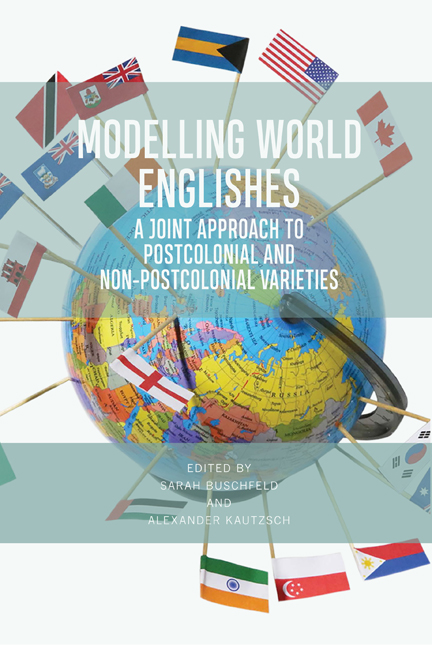Book contents
- Frontmatter
- Contents
- List of Figures and Tables
- List of Contributors
- Foreword
- 1 Introduction
- 2 English in England: The Parent Perspective
- 3 English in Namibia: Multilingualism and Ethnic Variation in the Extra- and Intra-territorial Forces Model
- 4 English in the United Arab Emirates: Status and Functions
- 5 English in India: Global Aspirations, Local Identities at the Grassroots
- 6 English in Singapore: Two Issues for the EIF Model
- 7 English in the Philippines: A Case of Rootedness and Routedness
- 8 English in South Korea: Applying the EIF Model
- 9 English in Japan: The Applicability of the EIF Model
- 10 English in Australia – Extra-territorial Influences
- 11 English in North America: Accounting for its Evolution
- 12 English in The Bahamas and Developmental Models of World Englishes: A Critical Analysis
- 13 Standard English in Trinidad: Multinormativity, Translocality, and Implications for the Dynamic Model and the EIF Model
- 14 Englishes in Tristan da Cunha, St Helena, Bermuda and the Falkland Islands: PCE, non-PCE or both? Blurred Boundaries in the Atlantic
- 15 English in Ireland: Intra-territorial Perspectives on Language Contact
- 16 English in Gibraltar: Applying the EIF Model to English in Non-Postcolonial Overseas Territories
- 17 English in Ghana: Extra- and Intra-territorial Forces in a Developmental Perspective
- 18 Synopsis: Fine-tuning the EIF Model
- Index
Foreword
Published online by Cambridge University Press: 24 September 2020
- Frontmatter
- Contents
- List of Figures and Tables
- List of Contributors
- Foreword
- 1 Introduction
- 2 English in England: The Parent Perspective
- 3 English in Namibia: Multilingualism and Ethnic Variation in the Extra- and Intra-territorial Forces Model
- 4 English in the United Arab Emirates: Status and Functions
- 5 English in India: Global Aspirations, Local Identities at the Grassroots
- 6 English in Singapore: Two Issues for the EIF Model
- 7 English in the Philippines: A Case of Rootedness and Routedness
- 8 English in South Korea: Applying the EIF Model
- 9 English in Japan: The Applicability of the EIF Model
- 10 English in Australia – Extra-territorial Influences
- 11 English in North America: Accounting for its Evolution
- 12 English in The Bahamas and Developmental Models of World Englishes: A Critical Analysis
- 13 Standard English in Trinidad: Multinormativity, Translocality, and Implications for the Dynamic Model and the EIF Model
- 14 Englishes in Tristan da Cunha, St Helena, Bermuda and the Falkland Islands: PCE, non-PCE or both? Blurred Boundaries in the Atlantic
- 15 English in Ireland: Intra-territorial Perspectives on Language Contact
- 16 English in Gibraltar: Applying the EIF Model to English in Non-Postcolonial Overseas Territories
- 17 English in Ghana: Extra- and Intra-territorial Forces in a Developmental Perspective
- 18 Synopsis: Fine-tuning the EIF Model
- Index
Summary
This book is dedicated to our colleague and my late husband Alexander Kautzsch, who died far too young, on March 2, 2018, after a severe heart attack. Back then, the book project was in its initial stages. We received acceptance for publication by Edinburgh University Press on February 23, the very day Alex suffered the heart attack; this is why I am so emotionally attached to the volume. It is based on the Extra- and Intra-territorial Forces (EIF) Model we developed in the summer of 2014. Since the original version of the model was presented in an article in World Englishes (John Wiley and Sons Ltd) in 2017, it has undergone further modification in a later article we wrote with Edgar Schneider (Buschfeld et al. 2018). I would therefore like to take the opportunity to thank Edgar for his generosity in helping us to rethink and modify some of the original ideas on his Dynamic Model. The EIF Model was not conceptualized as a counter-model but as a follow-up approach with a broader aim (viz. the integration of non-postcolonial varieties of English, something Edgar never had in mind). It thus has a wider and modified perspective, a reaction in essence to the most recent linguistic changes and scientific trends in the World Englishes paradigm.
The present volume constitutes the deliberate attempt to put the model to the test, a project we started working on in March 2017. The model and also the volume constitute a major achievement in both our academic careers, an achievement Alex will now not reap the fruits of. I have continued and finished this project as best as I could, but I would like to stress that the merit is not only mine. Those who I need to acknowledge and to whom I need to express my gratitude include the following:
First and foremost, of course, Alex needs to be acknowledged. Apart from having been an inspiring colleague, it was in Kautzsch (2014) that he generated the concept of extra- and intra-territorial forces that constitutes the scientific basis of the EIF Model.
My deep gratitude also goes to the authors of the individual chapters for their invaluable contributions, all of which have helped to assess, refine, and further the model in important ways.
- Type
- Chapter
- Information
- Modelling World EnglishesA Joint Approach to Postcolonial and Non-Postcolonial Varieties, pp. xi - xiiPublisher: Edinburgh University PressPrint publication year: 2020

